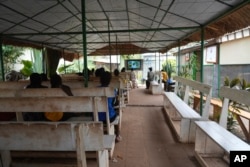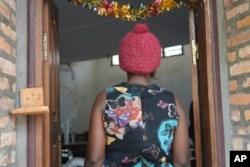The mother was too late to protect her children when two masked and heavily armed Russian fighters burst into her home, held her at gunpoint and took turns raping her. Her five children were forced to watch in the dark.
After the attack, she fled to the Central African Republic’s capital, where she wiped away tears as she sat in a restaurant. Two years on, she said, the attack “remains in my heart.” The AP did not identify the sexual assault survivor.
She accuses the Russians of being part of the Wagner mercenary group, which fights alongside Central African Republic troops and has been accused by locals and human rights groups of abuses. She had seen them patrolling Bambari town before. They were fighting rebels there on the day of the attack.
Gender-based violence is on the rise in Central African Republic due to ongoing conflict, weak legal and care systems and the stigma of speaking out, locals and aid groups say.
Reported incidents have jumped from about 9,200 to 25,500 since 2020, according to cases tracked by the United Nations and its partners.
But international funding to the country has declined, and gender-based violence has received minimal support. Less than 15% of some $14 million in humanitarian requests has been received, according to the United Nations
Central African Republic has been in conflict since 2013, when mainly Muslim rebels seized power and forced the president from power. Mostly Christian militias fought back. The 2019 peace deal only reduced fighting, and six of the 14 armed groups that signed it later withdrew from the deal.
Wagner, U.N. peacekeepers and Rwandan troops were on hand to try to quell the violence.
“More than a decade after this crisis began, many people remain displaced, vulnerable and living at the mercy of armed groups,” said Lewis March, Central Africa director at Human Rights Watch. “A new dynamic has also emerged. “Mercenaries allied to the government sometimes prey on local populations.”
Most likely not reported
Doctors Without Borders, one of the leading organizations working to end gender-based violence, said it has seen an increase in patient numbers due to expanded services and outreach. But most survivors may not come forward, often because help is not available where they live, the report said.
The 37-year-old woman, who fled to the capital Bangui, said she received mental health treatment and support for her children from an international aid group. She was afraid to go home and relied on selling charcoal in the market and charity from friends to make ends meet. She never reported the attack to the police because she believed it would be futile.
“Who can arrest Russians in this country?” she asked.
A local militant who worked with Wagner claimed that in early 2023, he saw six Russians raping a local woman in a tent at the Bambari base. He said the Russians then gave the women canned food such as sardines or bottled water. He spoke on condition of anonymity for fear of reprisal.
The Russian government did not respond to questions.
Aid groups say women generally do not blame Wagner because his fighters are so entrenched in their communities that they fear reprisals. During a visit by The Associated Press in March, Russians could be seen driving trucks around Bangui and on foot in the western town of Bouar.
Lucie Boalo Mbassinga, vice-president of the Association of Women Lawyers in Central Africa, said women who came forward found it difficult to get justice. She said 213 cases of sexual assault and rape were reported in 2022 and 304 cases were reported in 2023. Sometimes women open cases against local militants but withdraw them because the perpetrator’s family pays the survivor not to pursue the case, she said.
Funding cuts compound the challenge.
In November, Mbasinga’s organization shut down a project to help survivors in eight provinces, including the capital, because there was no more funding, she said. She said cuts at the United Nations Development Program left staff unable to reach women in more rural areas, accompany them to court and provide medical and mental health support.
“The victims were abandoned,” Mbasinga said. She suggested setting up mobile courts to better cover rural areas.
Donor fatigue and multiple global crises are part of the reason for the funding cuts, but some diplomats and aid workers say the Wagner mercenaries are so closely tied to governments and communities that it is difficult to justify aid. There are concerns the funds may be linked to Wagner.
Other culprits
But it wasn’t just Wagner warriors who were accused of rape.
The Associated Press interviewed three women who said they were sexually assaulted. Someone blamed Wagner. There were accusations of armed robbers. One of the security guards accused a UN peacekeeper.
The 39-year-old security guard said she was attacked last November while working a night shift at the home of peacekeepers in Bangui. She said he left her about $65 when it was over.
She asked her supervisor to move her to another house but never reported the assault. Her pastor warned her not to do it in order to keep her job.
Spokesman Vladimir Monteiro said the UN mission did not receive any allegations of sexual assault involving its personnel last November and stressed that the UN takes such allegations seriously.
The United Nations has long grappled with allegations of sexual assault by U.N. peacekeepers in the Central African Republic and elsewhere. Three years ago, the Secretary-General ordered the immediate repatriation of the entire United Nations peacekeeping force in Gabon following credible reports of sexual abuse.
The government’s Justice Ministry did not respond to a request for comment. The new constitution sets out measures to tackle the problem, saying authorities must ensure sexual assault is eradicated.
But that’s of little comfort to survivors.
In December, a 29-year-old woman said she was attacked in a market about 124 miles (200 kilometers) from Bangui. Three men armed with knives and machetes robbed her and one of them raped her.
She did not report the crime because she did not know the man and thought police would refuse to investigate.
Now the mother of two wants to move on. She found solace in a program run by Doctors Without Borders, meeting with a dozen other survivors every week.
“The advice I got was to not think about the aggressor and to stay busy,” she said.
Follow us on Google news ,Twitter , and Join Whatsapp Group of thelocalreport.in

